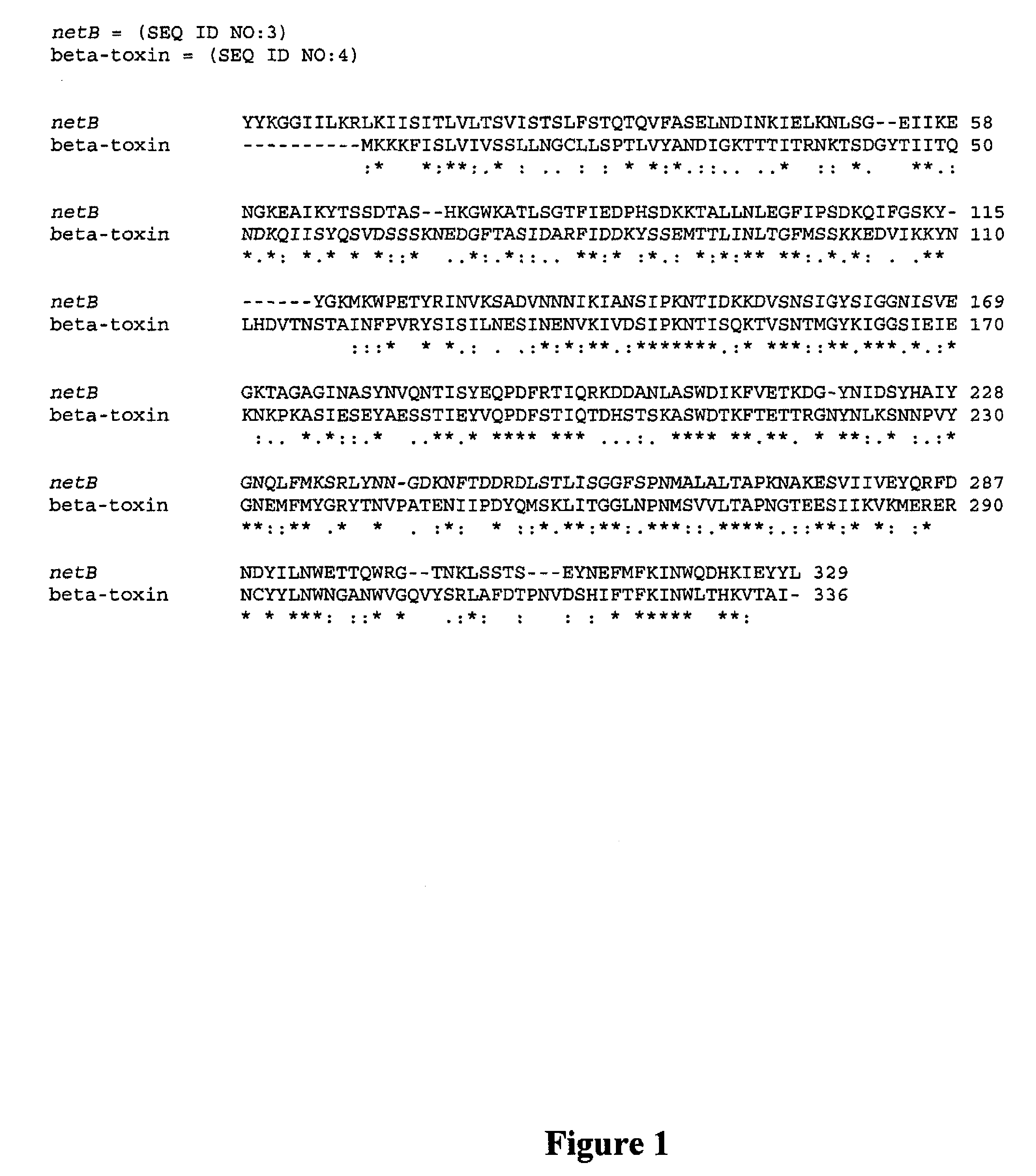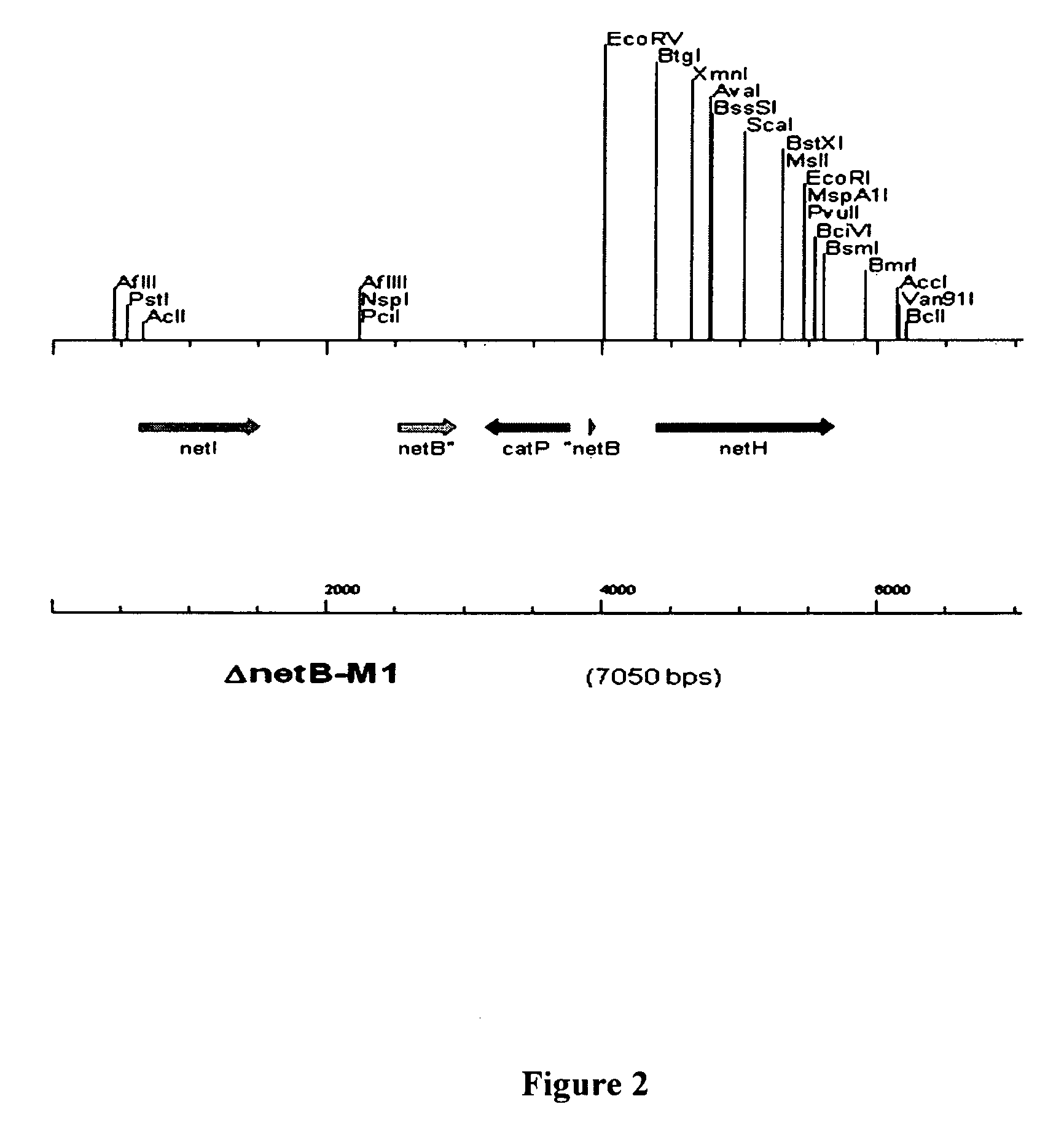Clostridial toxin NetB
a technology of clostridial toxin and netb, which is applied in the field of toxins, can solve the problems of morbidity and mortality of poultry, and achieve the effect of reducing infection and/or colonization
- Summary
- Abstract
- Description
- Claims
- Application Information
AI Technical Summary
Benefits of technology
Problems solved by technology
Method used
Image
Examples
example 1
Clostridium perfringens NetB Toxin
Sequencing of the Gene Encoding NetB
[0223]10 μg of genomic DNA isolated from Clostridium perfringens strain EHE-NE18 was used to obtain sequence reads, contigs and sequence quality scores. An amino acid sequence was deduced from the nucleotide sequence. Prediction of a signal peptide was performed using the SignalP v 3.0 program (Bendtsen et al., 2004). Sequences homologous to the deduced amino acid sequence were searched using the gapped BLAST program (Altschul et al., 1997).
[0224]The nucleotide sequence of the gene encoding NetB is provided as SEQ ID NO:1 and the amino acid sequence of NetB including the signal sequence is provided as SEQ ID NO:3. The signal peptide sequence is cleaved from the mature secreted protein (SEQ ID NO:2). A BLAST search identified C. perfringens beta-toxin as sharing less than 39% identity with NetB (FIG. 1).
Purification of Recombinant NetB and Generation of Rabbit Anti-rNetB Antisera
[0225]The netB gene was PCR amplifie...
example 2
Generation of C. perfringens Mutant Strain Lacking the Toxin
[0227]DNA manipulations were carried out according to standard techniques. Oligonucleotides used in the construction of the suicide plasmid were AKP60 (SEQ ID NO:7), AKP61 (SEQ ID NO:8), AKP58 (SEQ ID NO:9) and AKP59 (SEQ ID NO:10). All amplified products were cloned into the cloning vector pGEM®-T Easy vector system (Promega) and subsequently subcloned as required. The marked, partial deletion, suicide plasmid, pALK16, was constructed by cloning fragments of the netB gene region on either side of the catP cassette in pALK1 and resulted in a 541 bp deletion of the netB gene. First, a 1490 bp MfeI-SpeI fragment amplified using AKP60 and AKP61 was directionally cloned into the EcoRI-SpeI sites of pALK1, followed by cloning a 1937 bp BamHI-NheI fragment amplified using AKP58 and AKP59 into the BamHI-NheI sites of the resultant plasmid. Finally ermB and oriT amplified from pJIR1457 was blunt end cloned into the SmaI site. The f...
example 3
Assay of NetB Activity
[0228]A cytotoxicity assay was performed on C. perfringens EHE-NE18 culture supernatant. LMH cells were cultured until 70% confluence in 24 well plates coated in 0.2% gelatine and grown in EMEM medium at 37° C. Culture supernatant was added to the medium with 2 fold dilution across the plate up to 1:32 and incubated for up to 16 h at 37° C. The LMH cells incubated in the presence of either neat TPG culture media (FIG. 3a); C. perfringens EHE-NE18 culture supernatant, 1:16 dilution (FIG. 3b); C. perfringens JIR325 non-necrotic enteritis strain 13 culture supernatant, 1:2 dilution (FIG. 3c); or C. perfringens NE18-M1 (plc mutant not expressing alpha-toxin) culture supernatant, 1:16 dilution (FIG. 3d). Cytopathic effects (CPE) were observed under a light microscope at 100× magnification.
[0229]Normal cells (FIG. 3a) look healthy, however, addition of culture supernatant from a strain producing NetB causes the cells to round-up and die (FIG. 3b). Supernatant from a ...
PUM
| Property | Measurement | Unit |
|---|---|---|
| temperature | aaaaa | aaaaa |
| ionic strength | aaaaa | aaaaa |
| pH | aaaaa | aaaaa |
Abstract
Description
Claims
Application Information
 Login to View More
Login to View More - R&D
- Intellectual Property
- Life Sciences
- Materials
- Tech Scout
- Unparalleled Data Quality
- Higher Quality Content
- 60% Fewer Hallucinations
Browse by: Latest US Patents, China's latest patents, Technical Efficacy Thesaurus, Application Domain, Technology Topic, Popular Technical Reports.
© 2025 PatSnap. All rights reserved.Legal|Privacy policy|Modern Slavery Act Transparency Statement|Sitemap|About US| Contact US: help@patsnap.com



